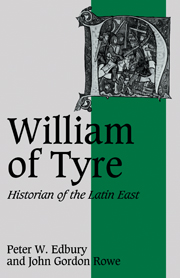Book contents
- Frontmatter
- Contents
- Preface
- Abbreviations and forms of reference
- Introduction
- PART I WILLIAM OF TYRE AND THE WRITING OF THE ‘HISTORIA’
- 1 William's career
- 2 William's historical writings
- 3 Classical and Christian influences in the Historia
- 4 William and his sources
- PART II WILLIAM OF TYRE AND THE MEANING OF THE ‘HISTORIA’
- Conclusion
- Bibliography
- Index
- Cambridge studies in medieval life and thought
4 - William and his sources
Published online by Cambridge University Press: 09 October 2009
- Frontmatter
- Contents
- Preface
- Abbreviations and forms of reference
- Introduction
- PART I WILLIAM OF TYRE AND THE WRITING OF THE ‘HISTORIA’
- 1 William's career
- 2 William's historical writings
- 3 Classical and Christian influences in the Historia
- 4 William and his sources
- PART II WILLIAM OF TYRE AND THE MEANING OF THE ‘HISTORIA’
- Conclusion
- Bibliography
- Index
- Cambridge studies in medieval life and thought
Summary
William of Tyre took the view that his personal experience provided the key for writing about the events of his own lifetime. Some events he had witnessed in person; others he had learnt of from others. But the very fact that he had been alive at the time, could remember his own immediate reactions and those of his contemporaries and had known many of the leading figures personally gave him a critical understanding and appreciation of what had been going on. By contrast, his perception of the events of preceding generations depended largely on unverifiable traditions, and from remarks in the preamble to Book XVI it is clear that he felt less secure about the adequacy of his account of them. He chose to signal the transition from his narration of past events to the account of his own generation with the accession of King Baldwin III in 1143. At that date he would have been in his teens, just a few years before his departure to the West to study in the Schools of France and Italy. To the modern historian there is nothing very different about the tone and content of the Historia for the decades either side of 1143, and we might prefer to divide the work at 1127, the point at which his last extant literary source, the Historia Hierosolymitana of Fulcher of Chartres, breaks off, and again at 1165, when William returned to the East and began his career in the hurly-burly of Latin Syrian public life.
- Type
- Chapter
- Information
- William of TyreHistorian of the Latin East, pp. 44 - 58Publisher: Cambridge University PressPrint publication year: 1988



